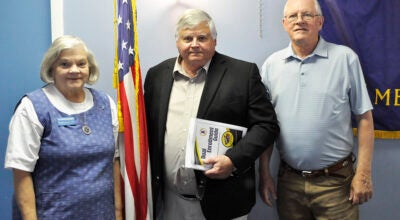Making ends meet
Published 8:54 pm Friday, July 31, 2009
With three months left in the fiscal year and an additional 2 percent proration declared by the governor, the local school systems have only one choice when it comes to making ends meet.
“We’ll pull from reserves,” said Troy City Schools Superintendent Linda Felton-Smith. “We had cut all we had to cut from the very beginning. I’m grateful for the reserves right now.”
For the Pike County School System it’s the same story.
“It’s going to affect our bottom line,” said Pike County Superintendent Mark Bazzell. “It’s going to affect what our anticipated reserves are going to be.”
When Gov. Bob Riley first declared 9 percent proration earlier this year, the Troy City Schools took a $1.3 million hit to its 2009 budget, and Pike County Schools lost around $1.2 million.
“We had to go into the reserve then,” Felton-Smith said. “First, we had to adjust codes and salaries. We used all the flexibilities and options allowed by the state” to cut costs and readjusts expenses.
But, the schools still had to pull from its reserves.
Bazzell said Pike County was able to cut around $586,000 from its operating budget by cutting non-essentials and readjusting funds.
That still took around $700,000 from its reserve funding.
When Riley announced an additional 2 percent proration July 24 for the remainder of the fiscal year, Felton-Smith and Bazzell both began crunching numbers.
“For us, this means $249,838,” Felton-Smith said.
“But the good news is, that’s divided over July, August and September, so we can pull from our reserves over those three months.”
Pike County will lose an extra $280,000 from its savings account, bringing the funds that started the year at $3.2 million down to $2.2 million.
Troy City Schools reserves, which once totaled just more than $8 million, are the funds accumulated over several years of fiscal management. Essentially, each year that the district ended with undisbursed revenues in its budget, whether due to unanticipated tax revenues, sound fiscal management or reduced expenses, the funds were put aside in reserves, or a savings account.
“Alabama has what is called ‘proration’ and because the state can prorate, or reduce, what it has promised to you in funding … when it does that, you have to figure out what your going to do to come up with those funds,” Felton-Smith said.
“That’s why we have those reserves.”
But, even if the school systems have these reserves to make it through this year, the hard times won’t be over when the budget year ends in October.
Both will begin the October 2010 budget already facing 6 percent proration. For Troy City Schools, that means an extra $663,956 reduction in the some $11 million state allocation for the budget year.
“We haven’t even talked about where we’re going with that,” Felton-Smith said.
Budget meetings begin this month, and dealing with proration issues will be key among the discussions.
“You know, 85 percent of our budget is personnel,” she said. “We will stay with the same staff we have for the 09-10 school year, but if we have resignations we will carefully review if we can maintain productivity without replacing the position.”
Moreover, she said, reductions in local sales tax revenues are compounded the constraints felt by state proration. With a 7.5 percent drop in June sales tax revenues, so far this year, Felton-Smith is concerned that July, too, may continue the decline.
While the bulk of budgeted expenses come from the state allocations, the local revenues often fund the extras in the budget, many of which could be at risk, she said.
“That’s why it’s so important for people to understand that the local sales tax receipts we receive help us do those extra things for the children,” she said. “It’s those dollars that make a difference in what we can do.”
And for Pike County that will mean a loss of $821,000 from the approximate $13.7 million state appropriation.
Likewise, Pike County Schools will not be able to cut personnel for the upcoming school year and will have to find other ways to reduce costs.
Bazzell said this year, parents, students and teachers probably felt little impact of proration, but that may not be the case as schools take the hit for the second year in a row.
“Travel might be the first things folks notice,” Bazzell said.
“We’re not going to do any traveling unless it’s absolutely necessary.”
However, keeping the cuts minimal will be the goal as the local school system begins budget planning also this month.
“One of the things we’ll try to do this year, just like last year, is try to make those cuts in areas where it affects the classrooms the very least,” Bazzell said.
With proration already taking an 11 percent toll on the state even after Riley withdrew all he could from the Rainy Day account, Bazzell said it will be years before the education budgets will recover fully.
“It’s a huge amount, and it will take years and years for us to get back to where we’re at,” Bazzell said.
“It will come off the top of any future budget when we are fortunate enough to have a turn around and have some growth.”





